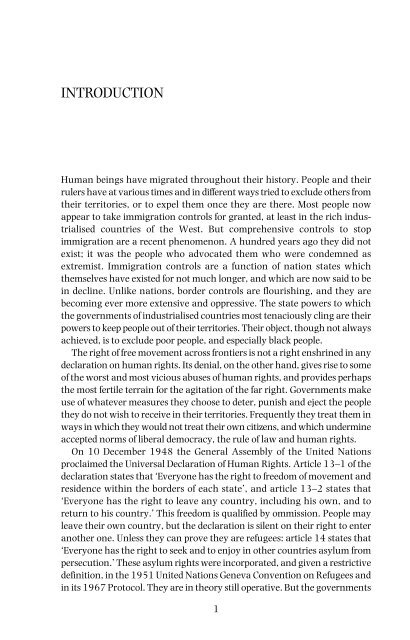Open%20borders%20The%20case%20against%20immigration%20controls%20-%20Teresa%20Hayter
Open%20borders%20The%20case%20against%20immigration%20controls%20-%20Teresa%20Hayter
Open%20borders%20The%20case%20against%20immigration%20controls%20-%20Teresa%20Hayter
You also want an ePaper? Increase the reach of your titles
YUMPU automatically turns print PDFs into web optimized ePapers that Google loves.
INTRODUCTION<br />
Human beings have migrated throughout their history. People and their<br />
rulers have at various times and in different ways tried to exclude others from<br />
their territories, or to expel them once they are there. Most people now<br />
appear to take immigration controls for granted, at least in the rich industrialised<br />
countries of the West. But comprehensive controls to stop<br />
immigration are a recent phenomenon. A hundred years ago they did not<br />
exist; it was the people who advocated them who were condemned as<br />
extremist. Immigration controls are a function of nation states which<br />
themselves have existed for not much longer, and which are now said to be<br />
in decline. Unlike nations, border controls are flourishing, and they are<br />
becoming ever more extensive and oppressive. The state powers to which<br />
the governments of industrialised countries most tenaciously cling are their<br />
powers to keep people out of their territories. Their object, though not always<br />
achieved, is to exclude poor people, and especially black people.<br />
The right of free movement across frontiers is not a right enshrined in any<br />
declaration on human rights. Its denial, on the other hand, gives rise to some<br />
of the worst and most vicious abuses of human rights, and provides perhaps<br />
the most fertile terrain for the agitation of the far right. Governments make<br />
use of whatever measures they choose to deter, punish and eject the people<br />
they do not wish to receive in their territories. Frequently they treat them in<br />
ways in which they would not treat their own citizens, and which undermine<br />
accepted norms of liberal democracy, the rule of law and human rights.<br />
On 10 December 1948 the General Assembly of the United Nations<br />
proclaimed the Universal Declaration of Human Rights. Article 13–1 of the<br />
declaration states that ‘Everyone has the right to freedom of movement and<br />
residence within the borders of each state’, and article 13–2 states that<br />
‘Everyone has the right to leave any country, including his own, and to<br />
return to his country.’ This freedom is qualified by ommission. People may<br />
leave their own country, but the declaration is silent on their right to enter<br />
another one. Unless they can prove they are refugees: article 14 states that<br />
‘Everyone has the right to seek and to enjoy in other countries asylum from<br />
persecution.’ These asylum rights were incorporated, and given a restrictive<br />
definition, in the 1951 United Nations Geneva Convention on Refugees and<br />
in its 1967 Protocol. They are in theory still operative. But the governments<br />
1


